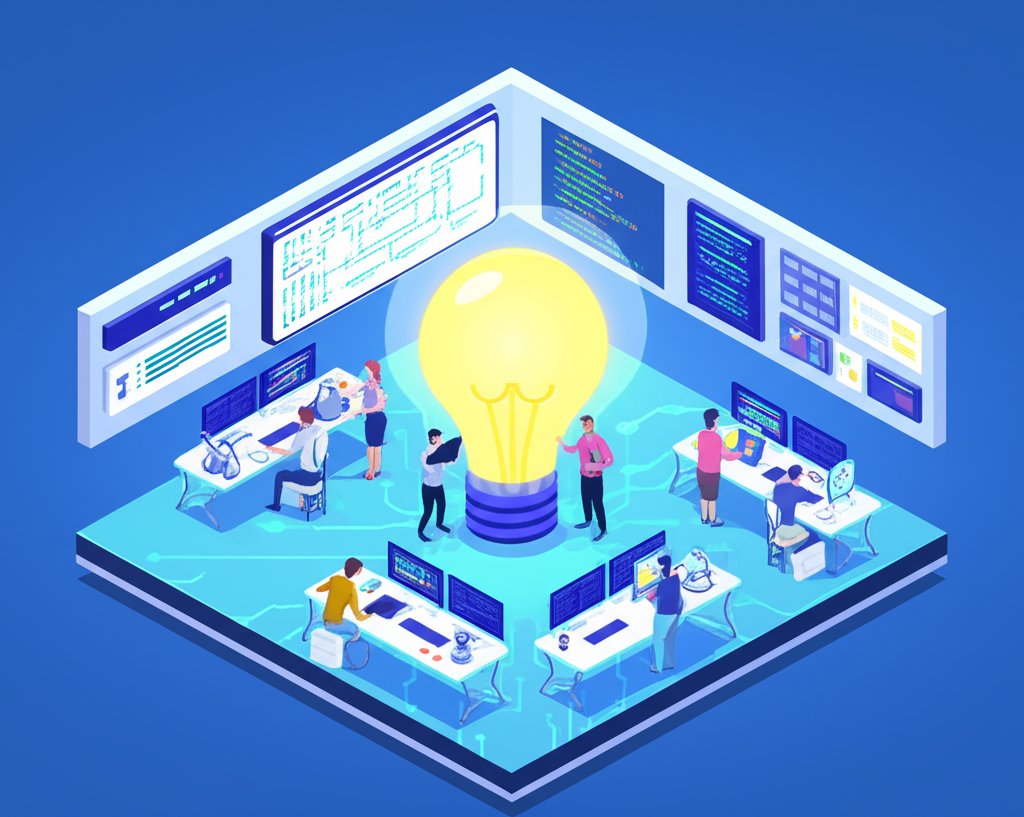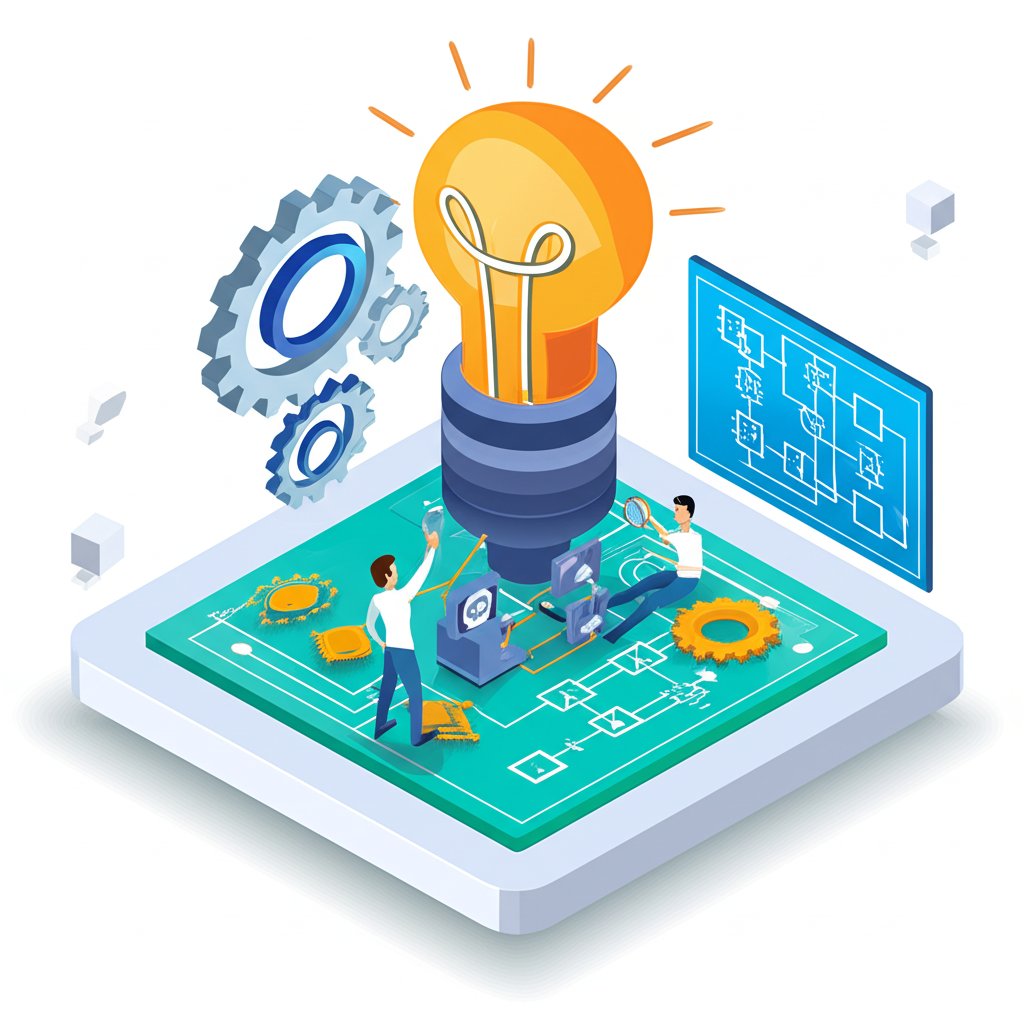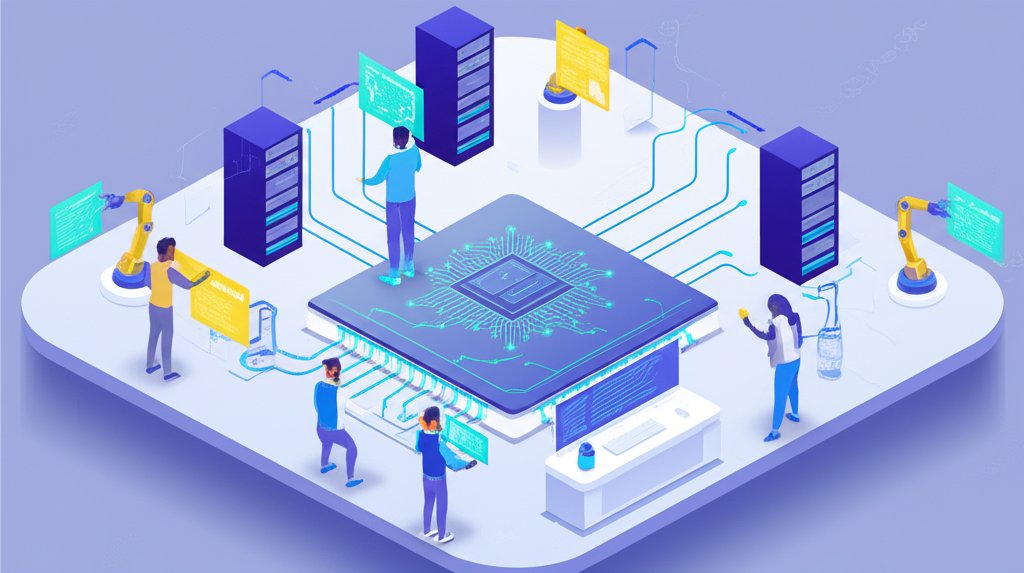In the vast chronicle of human achievement, a select few individuals stand out as the architects of progress, the visionaries whose ideas have reshaped civilization itself. These innovators are the masterminds behind the inventions that have not only defined eras but have progressively transformed our understanding and interaction with the world. From the simplest tools to the most complex digital ecosystems, every facet of modern life bears the indelible mark of groundbreaking technology. This article delves into the profound impact of these pioneers, exploring how their relentless pursuit of improvement has revolutionized technology and propelled us into an age of unparalleled technological advancements. Join us as we uncover the genius, the grit, and the enduring legacy of the individuals who dared to think differently.
The Essence of Innovators: Catalysts of Change
At the heart of every significant leap forward lies an innovator – an individual or group driven by a powerful blend of curiosity, dissatisfaction with the status quo, and an unwavering belief in a better way. These individuals aren’t just inventors; they are trailblazers who transform possibilities into realities that profoundly influence culture, economy, and daily life.
Defining the Modern Innovator
Innovators are individuals who develop or implement novel solutions to problems, often challenging existing norms across various fields. They are the architects of new paradigms, whether in science, engineering, art, or business. Their contributions catalyze significant advancements that ripple through society. For example, a single, elegant solution from an innovator can spark an entire industry.
Key characteristics consistently define these transformative figures:
- Creativity: The ability to think outside conventional boundaries and generate truly unique ideas. They connect disparate concepts to forge something entirely new.
- Risk-taking: A willingness to embrace uncertainty, invest time and resources into untested solutions, and face potential failure head-on.
- Resilience: The perseverance to learn from setbacks, adapt strategies, and persist despite obstacles and criticism. The journey of an invention is rarely linear.
- Vision: The foresight to anticipate future trends and align their efforts accordingly, often seeing potential where others see only problems.
We can also categorize innovators by their approach:
- Disruptive Innovators: These individuals introduce radically new products or services that create new markets and eventually overturn existing ones, fundamentally changing how things are done. Think of the smartphone disrupting traditional landlines and cameras.
- Incremental Innovators: They focus on enhancing existing products, services, or processes, leading to continuous improvement and refinement. This might involve making a software update more efficient or improving battery life in a device. Both types are crucial for the ongoing evolution of technology.
The Mindset Behind Groundbreaking Inventions
The genesis of all inventions is a particular mindset—one that thrives on problem-solving and an insatiable desire to understand. Innovators are often driven by deep empathy to alleviate human suffering, simplify complex tasks, or expand the realm of human capability. They observe deficiencies, question assumptions, and then embark on a rigorous process of experimentation, iteration, and refinement. This iterative cycle, fueled by passion and discipline, is where the initial spark of an idea is meticulously crafted into a tangible invention that can revolutionize an entire field of technology.
Landmark Inventions That Revolutionized Technology

Human history is punctuated by pivotal inventions that have redefined our existence. From ancient marvels to modern digital wonders, each breakthrough has laid the groundwork for the next, collectively forging the intricate tapestry of modern technology.
From Early Civilization to the Industrial Age
The journey of technological advancements began far before silicon chips and wireless signals. Early innovators laid the foundational stones of human progress:
- The Wheel (c. 3,500 BCE): While seemingly simple, this invention dramatically enhanced transportation, agriculture, and pottery, fundamentally altering trade and settlement patterns.
- The Printing Press (Gutenberg, c. 1440): This revolutionary technology democratized knowledge, making books accessible beyond the elite and sparking the spread of literacy, science, and new ideas across Europe.
- The Steam Engine (Newcomen, Watt, c. 1712-1781): A cornerstone of the Industrial Revolution, the steam engine revolutionized technology in manufacturing, mining, and transportation, powering factories and trains and ushering in an era of unprecedented industrial growth and urbanization.
The Digital Dawn: Key Technological Advancements
The 20th century saw an explosion of inventions that collectively launched the digital age, forever changing how we communicate, work, and live.
- The Transistor (Bell Labs, 1947): This tiny device replaced bulky vacuum tubes, paving the way for miniaturization and the development of modern electronics. It’s the silent hero behind almost all contemporary technology.
- The Microprocessor (Federico Faggin, Ted Hoff, Stan Mazor, 1971): Often called the “brain” of modern computers, the microprocessor was a colossal technological advancement. It integrated thousands of transistors onto a single chip, making powerful, compact computing devices possible and directly leading to the personal computer revolution.
- The Internet (Vinton Cerf, Robert Kahn, et al., 1970s onwards): What began as ARPANET for military and academic communication rapidly evolved into a global network. This invention connected the world, enabling instant communication, vast information access, and new forms of commerce and social interaction, truly revolutionizing technology and society.
- The Personal Computer (Apple I/II, IBM PC, 1970s-1980s): Innovators like Steve Jobs and Steve Wozniak at Apple brought computing power directly to individuals, moving it from specialized labs to homes and businesses, fundamentally altering work and leisure.
Modern Marvels: Connecting the World and Beyond
The pace of technological advancements has only accelerated in recent decades, with innovators continually pushing the boundaries of what’s possible.
- Wireless Communication:
- VoIP (Voice over Internet Protocol) by Marian Croak: This invention enables phone calls over the internet, dramatically reducing communication costs and expanding global connectivity.
- Bluetooth® Wireless Technology by Jaap Haartsen: This short-range wireless standard connects devices without cumbersome cables, enabling everything from wireless headphones to smart home integration.
- MIMO (Multiple-Input Multiple-Output) Wireless Technology by Arogyaswami Paulraj: Essential for modern Wi-Fi and cellular networks, MIMO increases data speed and range by transmitting and receiving multiple data signals simultaneously.
- Robust Network Routing and Bridging by Radia Perlman: Often called the “Mother of the Internet,” Perlman’s work on spanning tree protocol stabilized complex network infrastructures, ensuring smooth and reliable data flow, vital for the internet’s scalability.
- Smartphones: Combining computing, communication, and multimedia into a single, pocket-sized device, smartphones revolutionized technology by making advanced capabilities universally accessible.
- Artificial Intelligence (AI) and Machine Learning: From powering search engines and recommendation systems to enabling advanced medical diagnostics and self-driving cars, AI represents one of the most profound technological advancements of our time, with ongoing potential to reshape nearly every industry.
- Biotechnology and Genetic Engineering: Innovations in this field are transforming medicine, agriculture, and environmental science, promising new cures for diseases, more resilient crops, and sustainable solutions.
How Technology Revolutionized Industries and Society
The impact of innovators and their inventions extends far beyond the devices themselves; it permeates the very fabric of our society, fundamentally changing how we live, work, and interact. Technology has not merely improved processes; it has revolutionized technology across entire sectors.
Reshaping Communication and Connectivity
Perhaps nowhere is the transformative power of technology more evident than in communication. The evolution from telegraph to telephone, and then to the internet and smartphones, has created a hyper-connected world:
- Global Reach: Instantaneous communication across vast distances is now commonplace, facilitating global business, diplomacy, and personal connections.
- Information Access: The internet has become a boundless repository of knowledge, empowering individuals with unprecedented access to education, news, and diverse perspectives.
- Social Dynamics: Social media platforms, built on ingenious inventions, have redefined community, activism, and interpersonal relationships, creating both opportunities and challenges.
Transforming Healthcare and Quality of Life
Technological advancements have brought about a golden age in healthcare, extending lifespans and improving the quality of life for millions:
- Advanced Diagnostics: MRI machines, CT scans, and genetic sequencing offer unparalleled insights into the human body, enabling earlier and more accurate disease detection.
- Revolutionary Treatments: New drugs, surgical techniques (often robot-assisted), and personalized medicine approaches are curing previously untreatable conditions.
- Wearable Technology: Devices that monitor vital signs, track activity, and alert to health anomalies are empowering individuals to take a more proactive role in their well-being, revolutionizing technology’s role in personal health management.
Driving Economic Growth and New Opportunities
Innovators are powerful engines of economic growth, their inventions creating entirely new industries and markets.
- Digital Economies: The rise of e-commerce, software-as-a-service (SaaS), and the gig economy has restructured global commerce, creating millions of jobs and new forms of wealth.
- Increased Productivity: Automation and advanced manufacturing technology have boosted efficiency across industries, leading to higher output and lower costs.
- Global Supply Chains: Sophisticated logistics and communication technology enable complex global supply chains, connecting producers and consumers worldwide.
Impact on Education, Arts, and Daily Living
Beyond the quantifiable, technology has deeply influenced the qualitative aspects of human experience:
- Education: Online learning platforms, interactive tools, and virtual reality experiences are making education more accessible, personalized, and engaging.
- Arts and Culture: Digital tools have opened new avenues for creative expression in music, film, visual arts, and literature, enriching global culture.
- Daily Living: Smart homes, autonomous vehicles, and ubiquitous connectivity are transforming everyday tasks, offering convenience and efficiency that were once figments of science fiction. The ongoing technological advancements continue to redefine what’s possible in our daily routines.
The Continuous March of Technological Advancements: Looking Ahead
The story of innovators and their inventions is far from over. As we stand on the precipice of new frontiers, the pace of technological advancements continues to accelerate, promising both incredible opportunities and complex challenges.
Emerging Technologies on the Horizon
The next wave of innovators is already shaping the future with groundbreaking research and development:
- Artificial General Intelligence (AGI): The pursuit of AI that can perform any intellectual task a human can is a monumental goal, with potential to revolutionize technology across all sectors.
- Quantum Computing: This nascent technology harnesses quantum-mechanical phenomena to solve problems too complex for classical computers, with implications for cryptography, medicine, and materials science.
- Sustainable Technology: Innovators are focusing on solutions for climate change, renewable energy, circular economies, and efficient resource management—essential technological advancements for the planet’s future.
- Space Exploration and Colonization: Advances in rocketry, materials science, and robotics are making sustained human presence beyond Earth a tangible goal, opening new frontiers for scientific discovery and resource utilization.
- Bioconvergence: The merging of biology and engineering promises breakthroughs in areas like synthetic biology, advanced prosthetics, and personalized therapies.
Challenges and Ethical Considerations in Innovation
With great power comes great responsibility. The rapid pace of technological advancements also brings critical ethical and societal questions that innovators and policymakers must address:
- Bias in Algorithms: Ensuring that AI and machine learning systems are fair and unbiased, reflecting equitable societal values.
- Privacy and Data Security: Protecting individual information in an increasingly data-rich world.
- Job Displacement: Managing the societal impact of automation and AI on employment and workforce retraining.
- The Digital Divide: Ensuring equitable access to new technology and preventing the widening of socioeconomic gaps.
- Ethical AI Development: Establishing guidelines for the responsible creation and deployment of intelligence systems to prevent misuse.
- Funding and Resources: Securing adequate support for research and development, especially for high-risk, high-reward inventions.
Fostering Future Innovators
To sustain this trajectory of progress, society must actively cultivate the next generation of innovators. This involves:
- Investing in Education: Emphasizing STEM fields, critical thinking, creativity, and interdisciplinary learning from an early age.
- Promoting Collaboration: Encouraging diverse teams and cross-pollination of ideas between academia, industry, and government.
- Creating Supportive Environments: Establishing ecosystems that encourage risk-taking, tolerate failure, and provide resources for R&D and entrepreneurship.
- Celebrating Innovation: Recognizing and rewarding those who push boundaries and create positive change through their inventions and technological advancements.
Conclusion
The journey through the history of innovators and their groundbreaking inventions reveals a compelling narrative of human ingenuity. These masterminds have not merely introduced new gadgets; they have profoundly revolutionized technology, transforming industries, societies, and our very way of life. From the foundational tools of antiquity to the complex digital ecosystems of today, each technological advancement has built upon the last, propelled by individuals who dared to envision a different future.
As we look ahead, the continuous march of innovation promises further extraordinary change. It is imperative that we recognize, support, and inspire the innovators of tomorrow, fostering environments where creativity thrives and bold new inventions can emerge. Only then can we ensure that the transformative power of technology continues to serve humanity, creating a future that is more connected, healthier, and more prosperous for all.
FAQ Section

Q1: What defines an innovator in the context of technology?
A1: An innovator in technology is someone who develops or implements novel solutions, inventions, or approaches that significantly change existing methods or create entirely new fields. They are characterized by creativity, risk-taking, resilience, and vision, driving technological advancements that often revolutionize technology and society.
Q2: What are some key characteristics that most innovators share?
A2: Most innovators share characteristics such as exceptional creativity, a willingness to take risks, strong resilience in the face of setbacks, and a clear vision for the future. They are often driven by a deep curiosity and an intrinsic motivation to solve problems and improve the world with their inventions.
Q3: How have inventions broadly impacted society throughout history?
A3: Inventions have profoundly impacted society by enhancing communication, improving health and quality of life, driving economic growth, and transforming education and culture. Each major technological advancement, from the printing press to the internet, has reshaped human interaction, labor, and access to information, leading to societal revolutions.
Q4: Which specific technological advancements have had the biggest impact in recent decades?
A4: In recent decades, technological advancements like the microprocessor, the internet, wireless communication technologies (e.g., VoIP, Bluetooth, MIMO), smartphones, and the rise of Artificial Intelligence have had the biggest impact. These inventions collectively revolutionized technology by creating a globally connected, information-rich, and increasingly automated world.
Q5: What is the future outlook for technological innovation?
A5: The future outlook for technological innovation is one of rapid and transformative change. Emerging fields like Artificial General Intelligence, quantum computing, sustainable technology, and advanced biotechnology promise to further revolutionize technology and human capabilities. However, this future also necessitates careful consideration of ethical challenges like data privacy, algorithmic bias, and equitable access to new inventions.










